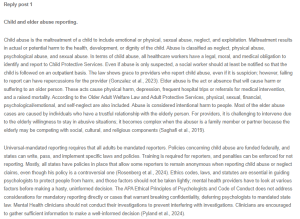Response – Child and Elder Abuse Reporting
Responding to Peer 1’s post
Hello,
Thank you for the enlightening post on the reporting of child and elder abuse. Perhaps the most relevant cultural aspect that needs to be taken into account is the outlook on reporting abuse within the family. Many societies provide attitudes that may hinder the reporting of abuse, especially when committed within a family by a close one. For instance, in some of the collectivist societies, the act of reporting a relative is discouraged and this may cause ridicule or shame to the family, hence leading to silence even when there is elder abuse. Furthermore, autonomy could have cultural variations that mental health clinicians must address when it comes to elderly people who strictly stick to the familiar instead of the patient’s choice (Stubbe, 2020). It is, therefore, important that these cultural dimensions be considered to be instrumental in the delivery of the legal and ethical mandates on the reporting norms without compromising cultural appropriateness and sensitivity.
References
Stubbe, D. E. (2020). Practicing cultural competence and cultural humility in the care of diverse patients. Focus, 18(1), 49–51. https://doi.org/10.1176/appi.focus.20190041
ORDER A PLAGIARISM-FREE PAPER HERE
We’ll write everything from scratch
Question 
Reply post 1
Child and elder abuse reporting.
Child abuse is the maltreatment of a child to include emotional or physical, sexual abuse, neglect, and exploitation. Maltreatment results in actual or potential harm to the health, development, or dignity of the child. Abuse is classified as neglect, physical abuse, psychological abuse, and sexual abuse. In terms of child abuse, all healthcare workers have a legal, moral, and medical obligation to identify and report to Child Protective Services. Even if abuse is only suspected, a social worker should at least be notified so that the child is followed on an outpatient basis. The law shows grace to providers who report child abuse, even if it is suspicion; however, failing to report can have repercussions for the provider (Gonzalez et al., 2023). Elder abuse is the act or absence that will cause harm or suffering to an older person. These acts cause physical harm, depression, frequent hospital trips or referrals for medical intervention, and a raised mortality. According to the Older Adult Welfare Law and Adult Protective Services, physical, sexual, financial, psychological/emotional, and self-neglect are also included. Abuse is considered intentional harm to people. Most of the elder abuse cases are caused by individuals who have a trustful relationship with the elderly person. For providers, it is challenging to intervene due to the elderly willingness to stay in abusive situations; it becomes complex when the abuser is a family member or partner because the elderly may be competing with social, cultural, and religious components (Saghafi et al., 2019).

Response – Child and Elder Abuse Reporting
Universal-mandated reporting requires that all adults be mandated reporters. Policies concerning child abuse are funded federally, and states can write, pass, and implement specific laws and policies. Training is required for reporters, and penalties can be enforced for not reporting. Mostly, all states have policies in place that allow some reporters to remain anonymous when reporting child abuse or neglect claims, even though his policy is a controversial one (Rosenberg et al., 2024). Ethics codes, laws, and statutes are essential in guiding psychologists to protect people from harm, and those factors should not be taken lightly; mental health providers have to look at various factors before making a hasty, uninformed decision. The APA Ethical Principles of Psychologists and Code of Conduct does not address considerations for mandatory reporting directly or cases that warrant breaking confidentiality, deferring psychologists to mandated state law. Mental Health clinicians should not conduct their investigations to prevent interfering with investigations. Clinicians are encouraged to gather sufficient information to make a well-informed decision (Pyland et al., 2024).
Reporting suspected cases should be done under APA ethical codes and should align with beneficence and non-maleficence, as well as respecting human rights and dignity. APA Code 4/02 covers privacy limitations, while APA Code 4/05 covers disclosing information concerning elder abuse. If elderly individuals have cognitive disorders, mental health clinicians should attempt to maintain confidentiality and contact legal authorities. APA Code 4/02 allows the disclosure of information in suspected abuse cases without the consent of the patient. APA Code 4/05 also enables sharing of the patient’s private information with the latter’s families or other experts to protect the patient from harm (Saghafi et al., 2019).
References
Gonzalez D, Bethencourt Mirabal A, McCall JD. (2023, Jul 4). Child Abuse and Neglect. StatPearls [Internet]. https://www.ncbi.nlm.nih.gov/books/NBK459146/
Pyland, C. P., Williams, M. G., & Mollen, D. (2024). Ethical and diversity considerations of mandatory reporting: Implications for training. Training and Education in Professional Psychology. https://doi.org/10.1037/tep0000485
Rosenberg, R., Williams, S. C., Martinez, V., & Ball, J. (2024). Mandated reporting policies and the detection of child abuse and neglect. Children and Youth Services Review, 159, 107499. https://doi.org/10.1016/j.childyouth.2024.107499.